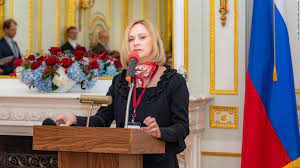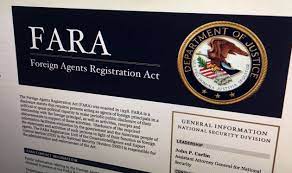DOJ Charges United States/Russian National with Acting as an Illegal Agent under FARA

The Justice Department alleged that Branson activities were consistent with Russian propaganda strategies and aggressive recruitment of diaspora around the world. Branson allegedly corresponded with President Putin personally and met with a high-ranking Russian minister before founding a Russian propaganda center in New York City, the Russian Center New York. From this organization, Branson launched an “I Love Russia” campaign aimed at American youths.
Given her relationship with Russian officials and her activities to promote Russian interests, Branson was required to register as a foreign agent under FARA. Branson chose not to register and instructed others engaged in similar activities to avoid registration under FARA.
As set out in the criminal complaint, beginning in 2011, Branson began her influence activities. In 2012 she organized the Russian Center New York. Branson received tens of thousands of dollars in funding from the Russian government. Branson used the Russian Center to host events and engage in public messaging at the direction of Russian officials. Branson was instructed to focus her efforts on Russian-speaking youth in the united States, Branson hosted an annual youth forum, funded in part by the Moscow government.
While working as a Russian agent, Branson received funding from the Russian embassy in Washington, D.C. and was instructed to take various steps at the behest of Russian government officials. Branson actively sought to hide her connection to the Russian government and she instructed her co-conspirators to do the same. She specifically advised others against using language that would trigger attention to FARA registration requirements.
In 2019, Branson coordinated a Russian Center campaign to persuade Hawaiian officials not to change the name of a fort located in Kauai, the last remaining former Russian fort in the Hawaiian Islands and is significant to the Russian government.

Branson also served as Chairperson of the Russian Community Council of the USA, which is partially funded by the Russian government. Branson used the website for the organization to promote messages from the Russian Embassy and organized events to spread information about Russian compatriots to ensure a positive image of Russia and Moscow.
In March 2016, Branson arranged meetings for Moscow economic officials to meet with New York States representatives. Branson also participated in a scheme to obtain fraudulent visas for Russian officials and their associates by providing information about specific events to use as a false reason to obtain visas to enter the United States.
The FBI interviewed Branson in September 2020. During the interview, Branson falsely claimed that she had never been asked by Russian officials to coordinate any meetings between U.S. officials and Moscow government officials. Branson subsequently left the United States for Russia.

Branson, who is 61 years old, was charged with six specific offenses: (1) conspiring to act as an agent of a foreign government without notifying the Attorney General, which carries a maximum sentence of five years in prison; (2) acting as an agent of a foreign government without notifying the Attorney General, which carries a maximum sentence of ten years in prison; (3) conspiring to evade FARA registration, which carries a maximum sentence of five years in prison; (4) willfully failing to register under FARA, which carries a maximum sentence of five years in prison; (5) conspiring to commit visa fraud, which carries a maximum sentence of five years in prison; and (6) making false statements to the FBI, which carries a maximum sentence of five years in prison.














